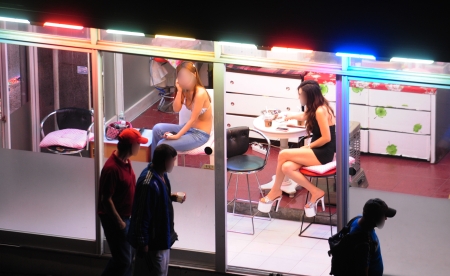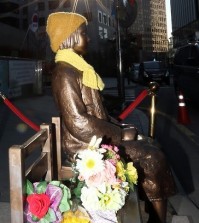- California Assembly OKs highest minimum wage in nation
- S. Korea unveils first graphic cigarette warnings
- US joins with South Korea, Japan in bid to deter North Korea
- LPGA golfer Chun In-gee finally back in action
- S. Korea won’t be top seed in final World Cup qualification round
- US men’s soccer misses 2nd straight Olympics
- US back on track in qualifying with 4-0 win over Guatemala
- High-intensity workout injuries spawn cottage industry
- CDC expands range of Zika mosquitoes into parts of Northeast
- Who knew? ‘The Walking Dead’ is helping families connect
[WSJ] South Korea’s Sex Industry Thrives Underground a Decade After Crackdown

The free-wheeling red-light districts that once dotted many of South Korea’s major cities have been mostly tamed. Many of the brothels that once operated in those districts have been forced out of business.
[THE WALL STREET JOURNAL] This fall marked the 10th anniversary of a sweeping anti-prostitution law in South Korea, meant to increase penalties for those who buy and sell sex, toughen police crackdowns against brothels and offer help for women seeking a way out of a life of prostitution. Buying or selling sex is illegal in South Korea.
The impact is clear: The free-wheeling red-light districts that once dotted many of South Korea’s major cities have been mostly tamed. Many of the brothels that once operated in those districts have been forced out of business. Those that remain face the threat of police raids.
But despite the law’s successes in red-light zones, the country’s sex trade continues to flourish underground, say people who follow the industry. Sex is just bought and sold in more discrete way than in the red-light districts of old. [READ MORE]















Matthias Lehmann
December 2, 2014 at 6:56 AM
“Journalism that harms, not helps: A response to Yewon Kang” (includes comments by Yeoni Kim)
Summary
In her article, Yewon Kang failed to mention anything about the repeated protests by sex workers against the Anti-Sex Trade Laws, about the frequent violations of sex workers’ rights, and about the dangers caused by police crackdowns and undercover sting operations. Instead of correctly conveying what a sex worker had told her about her work, she fabricated, misrepresented and misquoted her statements. Kang’s article adds to a public discourse already influenced by prejudices, misinformation and sensationalism, and in doing so, she harms sex workers who demand to have their rights protected, instead of having them further eroded by an increase in police crackdowns.
Continue reading: http://researchprojectkorea.wordpress.com/2014/11/29/journalism-that-harms-not-helps-a-response-to-yewon-kang/